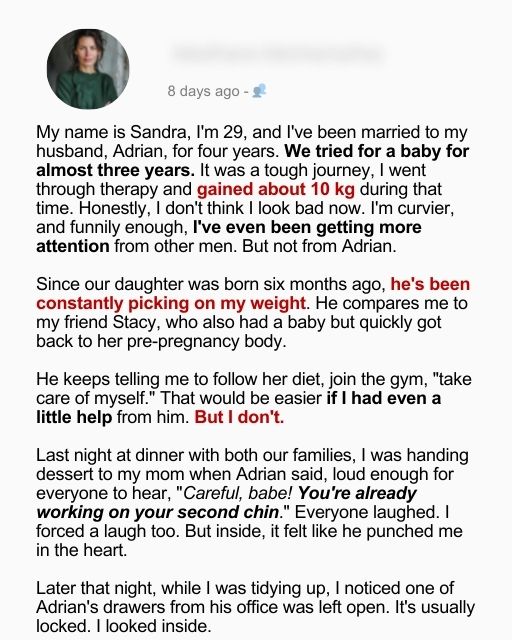My name is Sandra, I’m 29, and I’ve been married to my husband, Adrian, for four years. We tried for a baby for almost three years. It was a tough journey, I went through therapy and gained about 10 kg during that time. Honestly, I don’t think I look bad now. My body just changed. And funnily enough, I’ve even been getting more attention from other men. But not from Adrian.
Since our daughter was born six months ago, he’s been constantly picking on my weight. He compares me to my friend Stacy, who also had a baby but quickly got back to her pre-pregnancy body. He keeps telling me to follow her diet, join the gym, “take care of myself.” That would be easier if I had even a little help from him. But I don’t.
Last night at dinner with both our families, I was handing dessert to my mom when Adrian said, loud enough for everyone to hear, “Careful, babe! You’re already working on your second chin.” Everyone laughed. I forced a laugh too. Tried to play it off. But inside, it felt like he punched me in the heart.
Later that night, while I was tidying up, I noticed one of Adrian’s drawers from his office was left open. It’s usually locked. I looked inside. At first, I thought it was just paperwork or old receipts, but then I saw something that made my stomach drop. There, neatly folded, were dozens of pictures—not of anything important, but of me. Pictures from before our baby, pictures from after, some even taken while I slept or changed in the bedroom. My heart raced. Why would he have these?
I felt sick, my hands trembling as I flipped through them. The thing that hurt the most wasn’t just the invasion—it was what he had written on sticky notes attached to some of them. Words like “fat,” “lazy,” “unattractive.” I felt betrayed, used, humiliated. And that’s when I noticed something else: a little notebook beneath the pile.
I opened it and found it filled with lists. Not lists of work, not reminders—it was rankings of me. “Worst angles,” “bad posture,” “needs to lose weight.” Each page was a new obsession. The more I read, the more the pieces fit together. Every insult, every comparison, every cruel comment at dinner—it wasn’t about joking. It was calculated.
I sat on the floor, my mind spinning. I thought about our daughter, about how Adrian sees her mother every day and yet could treat me like this. Then, I heard a sound behind me. Adrian was standing in the doorway, his face pale.
“I—I didn’t expect you to find that,” he stammered.
I didn’t respond. I just held the notebook tighter, my chest aching with a mix of anger and sadness.
“I was… I was trying to motivate you,” he said weakly, as if that explained years of humiliation. “I thought… maybe if I pushed you, you’d try harder…”
I laughed bitterly. “Push me? Adrian, this isn’t motivation. This is obsession. This is cruelty.”
He tried to reach for me, but I recoiled. My trust was shattered, and something inside me had finally snapped.
The next few days were a blur. I couldn’t look at him the same way. I started thinking about my life, our daughter, and how toxic Adrian had become. I reached out to my mom and my closest friend, telling them everything. Their support was immediate and unconditional.
One afternoon, I came home from taking the baby for a walk, and Adrian tried to talk to me. He begged me to forgive him, to “understand his perspective,” to see that he could change. But I realized something crucial: some people don’t change. Some people hide cruelty behind charm and apology, hoping you’ll stay because of love or fear of being alone.
